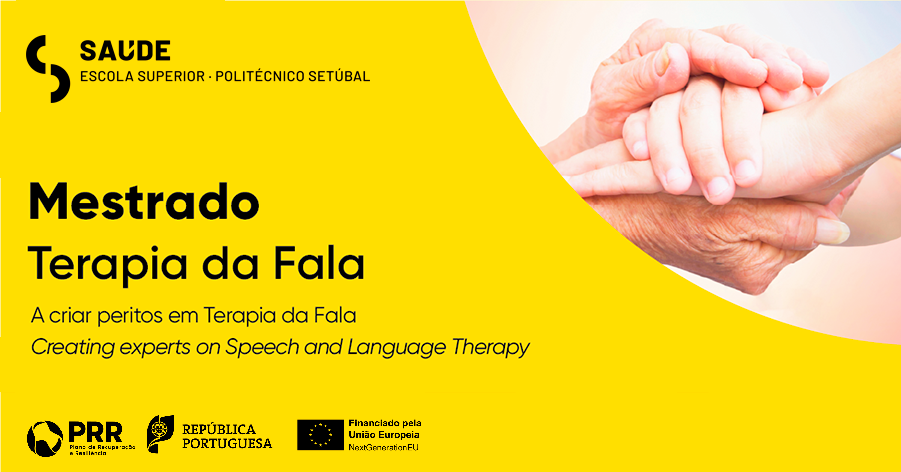MSc in Speech Therapy
About
This proposal for a 2nd cycle course - Master's Degree in Speech and Language Therapy - presents a study plan that aims to meet the postgraduate training needs of speech and language therapists.In the 1st year, students develop advanced skills in cross-cutting areas of Speech and Language Therapy in terms of:
(i) critical analysis and development of assessment and intervention instruments, (ii) evidence-based practice and practice-based evidence, (iii) ) models of action (operational levels of intervention including preventive, group and/or individual, face-to-face and/or at a distance, with and/or without the use of technologies, using multi-professional collaborative practices, focusing on the client and in its empowerment, of their caregivers and/or family, among other aspects). At the same time, students develop specialized skills, individualizing their path from the options available in specialty areas: speech, language, fluency, voice and swallowing in children and adults. Still in the 1st year, students systematize and deepen knowledge that will allow them to plan and execute their projects, as well as adopt systematized mechanisms for the design and monitoring of their clinical practices.
In the 2nd year, students complete the study cycle, choosing to develop a dissertation or a project work, reflecting their interests and motivations, and/or their experience and needs in terms of professional practice. In this process, they refine their research skills, contributing to the transfer and original application of knowledge to Speech andLanguage Therapy.
The teaching-learning model of this course is mixed (b-learning), face-to-face and at a distance (with synchronous classes), compatible with different profiles of students, whether they are engaged in a professional activity or not. The curricular units include diversified teaching-learning methodologies, with articulation between theory and practice, and the active participation of students, allowing the application of knowledge to concrete situations and its generalization to other counterparts. Learning involves the interaction between cognitive (thinking/knowledge and reasoning), intrapersonal (behavior and emotions) and interpersonal (communication and collaboration) aspects, which can betransferred to real practice contexts. From their practice contexts, students bring clinical cases and professional practices into the classroom, fostering realistic and emotionally connected learning.
The inter-institutional partnerships will be profitable and strengthened, involving in teaching national and foreign collaborators, with differentiated clinical and research practices in Speech and Language Therapy and related areas. Access to communities of practice and research promotes sharing of experiences and collaboration among peers,generates opportunities for collaborative learning and promotes multiprofessional research practices.
Goals
The Master's programme in Speech and Language Therapy aims to:
-
- develop advanced skills in clinical assessment, selection and implementation of effective therapeutic approaches consistent to the client's profile;
- implement evidence-based practices, centered on the client (and his environment), grounded in research and in the professional experience of the speech and language therapist, their peers and other professionals;
- develop the ability to analyze, interpret and select results and make informed and effective clinical decisions;
- develop problem-solving skills and research applied to Speech and Language Therapy;
- promote self-directed and autonomous learning and innovation in professional practice;
- contribute to the development of expertise in Speech and Language Therapy;
- empower speech and language therapists for consulting and training roles in Speech and Language Therapy;
- contribute to the research development in Speech and Language Therapy.
In this programme, students must develop:
- advanced knowledge in specialty areas of Speech and Language Therapy, in order to support critical thinking and develop specialized competencies;
- advanced clinical reasoning in the analysis of the assessment process in Speech and Language Therapy and its effects on the diagnosis, planning and implementation of the intervention;
- competence to design and implement individualized intervention plans, integrating critical analysis of the available evidence and the risks and benefits of the intervention;
- critical reflection of their performance and of others involved in practice contexts, using this reflection to inform future practice and personal and professional development;
- ability to plan and implement research projects applied to complex study or work contexts, contributing to the consolidation and development of knowledge and professional practices in specialty areas of Speech and Language Therapy.
Accreditation
- Course accredited by A3ES for 6 years (in 2022)
- More Information: A3ES Accreditation
Course Coordinator
- DIna Alves, PhD (dina.alvesnull@ess.ips.pt)
Teaching Language: Portuguese
For further information please contact us or the course coordinator:
Tel. (+351) 265 709 331
Email: infonull@ess.ips.pt


